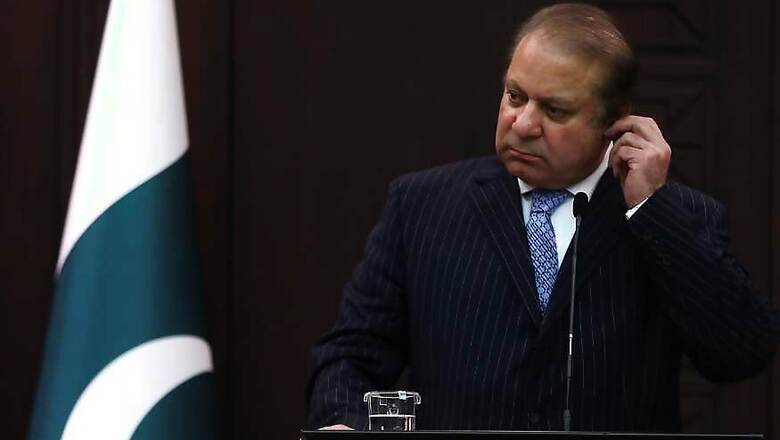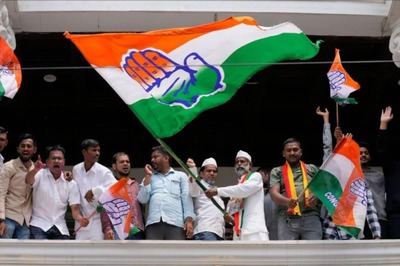
views
Umar Cheema was the only Pakistani journalist involved in the Panama Papers investigation with International Consortium of Investigative Journalism that started in 2013. He is the founder of Center for Investigative Reporting in Pakistan, a non-profit to resist the “corporatization of mainstream media in Pakistan”. The Center is also member of Global Investigative Journalism Network. In an email interview to News18’s Eram Agha, he says the highest point of this collaboration was the impact it generated. “Nowhere in the world has the investigation been kept alive the way it has been done here in Pakistan,” he says. Edited Excerpts:
There have been disqualification of premiers in Pakistan before as well. Why is the verdict on Nawaz Sharif being seen as a ‘wrong precedent’ by a section of civil society in Pakistan?
Yes, Sharif isn’t the first PM to have been ousted. But the reason for the same is why the verdict is being debated as setting a bad precedent. Sharif and his children were facing probe triggered by the Panama Papers investigation, which put forth four apartments in London that they own through two offshore companies. His disqualification has, however, happened for a charge unrelated to this: For not declaring income as the Chairman of Dubai-based Capital FZE, which dissolved in 2014. Although Sharif did not withdraw any salary, the court has said it should have been declared in assets details.
This controversial decision has raised many questions about the future of democracy and how an elected Prime Minister can easily be sent home without getting an opportunity to defend his position on the particular point. This is what is being highlighted in Sharif’s case. There’s no denying that being the top office holder doesn’t immune one from accountability and disqualification without due process of law, but he wasn’t given a chance to defend himself. That is highly unfortunate.
Does this expose the state of relationship between the courts and the executive in Pakistan?
Pakistan government has always had a tough relationship with the Supreme Court and transition of power from one premier to another has often been painful. But what politicians must understand is that democracy is not just holding elections and forming government. It is also about improving public services and upholding the rule of law. Politicians often complain of being decorated with official titles but deprived of power. They will have to strengthen themselves through caliber and character. Rights are earned, they aren’t granted.
What will be political impact of Sharif’s exit?
Sharif is a popular leader. Whether his exit is for good remains to be seen. He will file a petition seeking review of the verdict. Let’s hope the court realizes this fact too. Else, the disqualification of a popular leader on a petty matter will haunt the court for years to come. The verdict has given Sharif a new lease of political life. Prime Minister Zulfiqar Ali Bhutto became a larger than life figure after he was hanged due to a fabricated murder charge against him. That is still remembered as a judicial murder. Sharif is about to attain that ‘grand’ status, without being hanged.
Will this change or rather enhance the significance of Tehreek-e-Insaf Chairman Imran Khan in Pakistan, who was one of the petitioners in the case?
Imran has channelized the anger of disaffected population; youth in particular. However, Sharif’s party still commands popularity. It’s tricky to predict about who the winner will be in 2018 election at a time when voters are surprising the pundits around the world, but it’s still believe that Sharif’s party is a frontrunner in the elections.
Do you think the Sharif verdict sets an example? What will be the global implications for those who abused power for personal gains?
I wish the Sharif family could have been brought to justice on the basis of revelations in Panama Papers. Although the family’s scrutiny started in light of the Panama Papers findings, it culminated on Sharif’s ouster on frivolous charges, which has nothing to do with his children’s offshore companies. That case has been referred for trial. Let’s see what emerges from it.
That said, the message is loud and clear: the higher office you hold, the stricter scrutiny you will face. There is also no place in the world where you can hide your fortune. The world is opening up. We are living in the age of leaks that are shining lights on the dark parts of the world.
Everything aside, is this verdict the real test for the Pakistani judiciary?
The real test for the judiciary is how it deals with the cases about the military that doesn’t face as much scrutiny as politicians. Power actors have changed their ways to exert influence. Another coup can’t be ruled out, but it seems unlikely. Former military ruler, Musharraf, is a case in point. He was facing trial for subverting Constitution when sent abroad for medical treatment a year ago. He’s not likely to return anytime soon.
How deeply is corruption plaguing Pakistan’s politics and economy?
The need for truth and honesty led me to set up the Center for Investigative Reporting in Pakistan in 2012. Its inauguration coincided with the first-ever report about the taxes of lawmakers that made international headlines. Pakistan’s economy is largely undocumented. Of around 220 million, only one million file tax returns; half of these people declare zero taxable income in a culture of impunity. The poor subsidize the rich in Pakistan. The issue of taxation is close to me. I started a campaign against tax evasion in 2012 by reporting about the Members of Parliament. What we found was depressing: Around 70% lawmakers had not filed tax returns; one in five MPs was without National Tax Number, which is mandatory for filing tax returns. A follow-up report the next year found one in 10 lawmakers with NTN and half of MPs were non-filers of tax returns.
After this report, how did the Pakistan government react?
Well, after the report, the government set a deadline for the lawmakers to register themselves for NTN and file tax returns in addition with an announcement to make tax data public. With this, Pakistan has become the fourth country in the world where tax data has been made public after Norway, Sweden and Finland. Inspired by my campaign, a London-based organization, Finance Uncovered, replicated this initiative at the global level in 2016.
Coming to press freedom in Pakistan, journalist Cyril Almeida was barred from leaving Pakistan after he wrote a news article. In 2010, you were kidnapped and tortured for your reporting on government. How do you see press freedom in Pakistan?
We have all started journalism knowing the consequences. Threats persist but the nature of harassment varies.
I went public after my kidnapping and torture in 2010. I thought the decision of going public would send a strong message to the kidnappers. We were wrong. Saleem Shehzad, another journalist, was killed in 2011. Bloggers were picked up last year. These are the incidents that gained international attention because they occurred in Islamabad. Hamid Mir, a popular TV anchor, had survived an attempt on his life in 2014.
Many other journalists have been targeted; several of them were killed. Cyril’s case was different in a sense that the matter was taken up at the highest level. Intended targets were a few individuals close to Sharif. An inquiry into the leak of information failed to find the leaker, however, the inquiry panel recommended action against a couple of ministers and a bureaucrat for their failure in stopping the news from publication. But it’s a fact that journalism is a dangerous career in Pakistan. And mainstream media has been corporatized.


















Comments
0 comment